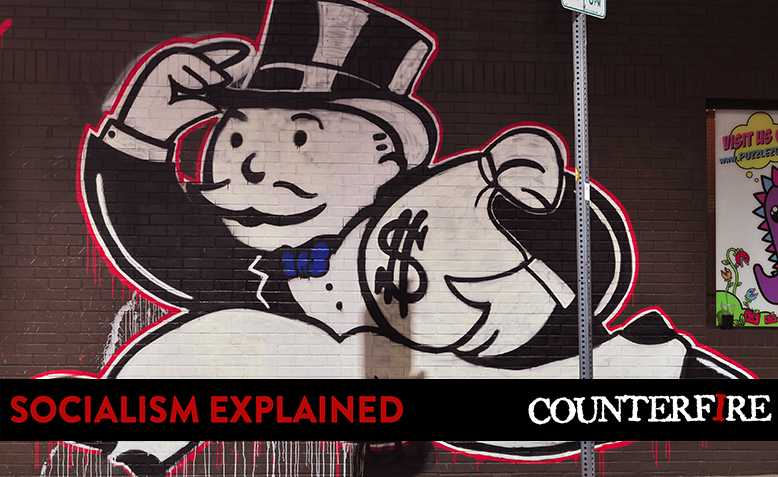 'Mr Money Bags' by Alec Monopoly. Photo: Flickr/aisletwentytwo
'Mr Money Bags' by Alec Monopoly. Photo: Flickr/aisletwentytwo
Lucy Nichols dissects the idea that humans are inherently selfish
Counterfire’s Socialist Explainers series
The idea that humans are selfish and greedy is often used to try to discredit socialists. The right claims that human nature renders socialism an impossible, utopian dream.
The argument runs that because we are all selfish, it is only natural that we live under an economic system in which ‘greed is good’. The contention is that free market capitalism is an expression of human nature: self-interest rules and humans must compete on the market to meet their needs.
Two other conclusions follow. One, that there needs to be a strong central authority to hold our egotistical behaviour in check. Two, that any attempt at collectivism is doomed by our selfishness.
There are many indications that these assumptions are false and that people often act with kindness and cooperation.
Take the current crisis. During the pandemic, nurses and doctors and other workers have put their lives at risk despite poor working conditions, low pay, and lack of PPE. Mutual aid groups have sprung up to support the most vulnerable.
Millions have shown support for key workers. Despite all the difficulties, the majority of people have been observing the lockdown, very often not simply out of self-interest but to protect others and wider society.
Even in ‘normal’ times millions of people work in the NHS, social services and other parts of the welfare state on low pay and often because they want to improve the lives and conditions of others.
Particularly at times of popular struggle, there are fantastic acts of solidarity and self-sacrifice. In the last few weeks, millions of people around the world from all races and backgrounds have come out to protest police violence in support of the US Black Lives Matter movement.
Given this potential, how come the world remains so unequal and competitive? The mainstream, capitalist explanation is that we are born unequal: some of us possess talents that others do not, some of us are lazy and others are hardworking. This – paired with the idea that we are also naturally selfish – explains deep-seated inequality.
Socialists argue that actually things work the other way around. Humans have the capacity to behave in different ways and more than anything our behaviour is shaped by the society that we live in. It is the way that capitalism is organised that encourages people to ‘look after number one’. The capitalists themselves ruthlessly exploit working people for their own profit and are in constant competition with each other. The rest of the population have no choice but to compete for jobs, for housing and services and to buy shoddy goods produced for profit by the big corporations. All this is backed up by an education and media that constantly reproduce the idea that it is self-interest that drives society.
There is another side to our experience under capitalism. The existence of trade unions and left wing parties, struggles for better wages, for health and safety at work or for better services and benefits all show that working people know that there is such a thing as society. Working people regularly push back against exploitation and want society to be fairer and more collective.
Collectivity is at its most intense when great struggles break out, whether against racism or austerity or job cuts. In these circumstances human solidarity comes to the fore, ideas of competition start to break down, and people focus their energies on trying to force change that will very often benefit all working people. At these moments it becomes clear that human’s defining nature is our ability to collectively change the world.
Join Revolution! May Day weekender in London
The world is changing fast. From tariffs and trade wars to the continuing genocide in Gaza to Starmer’s austerity 2.0.
Revolution! on Saturday 3 – Sunday 4 May brings together leading activists and authors to discuss the key questions of the moment and chart a strategy for the left.

